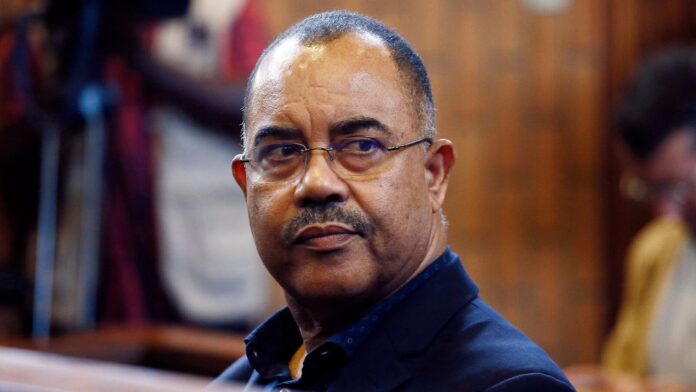NEW YORK — The ” tuna bond “A scandal that has rocked Mozambique’s economy is spilling over into a U.S. court, where a former Mozambican finance minister is on trial on charges he secretly accepted bribes to get his country into massive loans that prosecutors say were looted.
When the loans, some of which were intended for tuna fishing vessels, failed and the government’s $2 billion in “hidden debt” came to light in 2016, a financial crisis erupted in Mozambique, one of the world’s poorest countries.
This week, the jury began hearing the case against Manuel Chang, the African country’s top financial officer from 2005 to 2015.
Chang “abused his authority to enrich himself through bribery, fraud and money laundering,” Assistant U.S. Attorney Peter Cooch said during his opening statement this week in a Brooklyn federal court.
Chang has pleaded not guilty conspiracy charges. Defense attorney Adam Ford told the jury there was no evidence Chang agreed to accept payments, or received a penny, in exchange for Mozambique’s guarantee that the loans would be repaid.
“Minister Chang is signing these assurances because that is what his government requires of him,” Ford said Tuesday.
A key prosecution witness took the stand on Wednesday, as Chang followed the trial closely through a Portuguese interpreter.
Between 2013 and 2016, three Mozambican government-controlled companies quietly borrowed $2 billion from major foreign banks. The government, with Chang’s signature, guaranteed repayment.
The money would go towards tuna fishing vessels, a shipyard, coast guard vessels and radar systems to protect natural gas fields off the Indian Ocean coast.
But prosecutors say large portions of the loan proceeds went toward bribes and kickbacks to bankers and government officials, including $7 million to Chang himself, wired through U.S. banks to accounts in Europe held in the name of an associate.
Prosecutors allege that Chang was merely trying to cover his tracks by sending the money to a friend’s account. Chang’s defense maintains that there is no evidence he actually received the money.
The first witness, former Credit Suisse banker Andrew Pearse, testified Tuesday and Wednesday about his involvement in the loans, which he said netted him $45 million in bribes. He has pleaded guilty and is awaiting sentencing.
The government guarantees Chang signed were crucial because the brand-new companies “weren’t good enough risks for the banks to lend money to” without a safety net, Pearse said.
Although he testified that he met Chang twice, the defense has said the two never entered into an agreement. Defense attorneys have not yet been allowed to cross-examine Pearse, but Ford portrayed him during opening statements as a government employee eager to gain leniency for his testimony.
Before Mozambique took on $2 billion in debt (then about 12% of the country’s gross domestic product), it was among the world’s 10 fastest-growing economies for two decades, according to the World Bank.
The scandal had a seismic impact on the country’s economy. Growth stagnated, the currency lost value, inflation rose and foreign investors lost confidence. The International Monetary Fund withdrew its support for the country.
A 2021 report by the Chr. Michelsen Institute, a development research body in Norway, estimated that the loans could ultimately cost Mozambique about $11 billion – about 60% of current GDP. The institute said the crisis also likely pushed nearly 2 million Mozambicans into poverty, as international investment and aid shrank and the government cut services to raise money.
Last year, Mozambique was among the 10 countries worldwide with the lowest GDP per capitaaccording to the World Bank.
Mozambique’s government has reached out-of-court agreements with creditors in an effort to pay off some of its debt. Last year, it repaid $142 million to Credit Suisse — in cash and local-currency bonds — to cover original loans of about $522 million from the Switzerland-based banking giant, the World Bank said. Mozambique also recently reached a $220 million settlement agreement with Russia’s VTB Bank and Portugal’s BCP Bank.
The scandal has led to lawsuits in Africa and Europe, as well as in the US.
In 2021, Credit Suisse agreed to pay at least $475 million to British and US authorities to resolve allegations of bribery and kickbacks arising from the bank’s involvement in the corrupt loans.
At least ten people have been convicted and sentenced to prison terms in Mozambique over the scandal, including Ndambi Guebuza, the son of former Mozambique President Armando Guebuza.
South African courts have rejected attempts by the Mozambican government to have Chang charged there. Some Mozambican activists argued that he would be treated too leniently in his home country and should be sent to the US instead.
The U.S. criminal cases have had mixed results. Pearse and two other British bankers pleaded guilty, but a jury in 2019 acquitted another defendant, Jean Boustani, a director of a shipbuilding company in Lebanon.
Three other suspects are not in U.S. custody. One is another Lebanese shipbuilder. The other two are Mozambican ex-officials.
Chang was arrested at Johannesburg’s main international airport in late 2018, shortly before the US indictment made public. After years of fight against extradition from South Africa, he was brought to the US last year.
His lawyers sought to have the case dismissed. Among their arguments: that prosecutors overstepped the scope of U.S. securities laws and that Chang is immune from prosecution as a former foreign official.
U.S. District Judge Nicholas Garaufis denied their request.
___
Associated Press editor Mogomotsi Magome contributed from Johannesburg.



